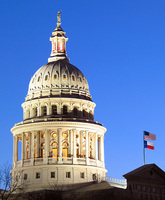Bills filed seeking to change revised franchise tax
December 3, 2008
As of Nov. 25, the total revenue from the state’s revised franchise tax for fiscal year 2009, which includes September, October and November, is about $195.7 million, said R.J. DeSilva, spokesperson for the State Comptroller’s office.
Written by Leslie Wimmer, Fort Worth Business Press

As revenue for the state’s revised franchise tax continues to add up, several bills have been introduced to the state legislature to change the tax and give business owners some breathing room.
As of Nov. 25, the total revenue from the state’s revised franchise tax for fiscal year 2009, which includes September, October and November, is about $195.7 million, said R.J. DeSilva, spokesperson for the State Comptroller’s office.
“This number could change as we finish up processing final reports and issue any refunds as well, if companies had previously made overpayments,” DeSilva said. “We’re also analyzing data for the Business Tax Advisory Committee report. That report will break down the distribution of the franchise tax among industries and various sizes of businesses in those industries. The final report will be sent to the Legislature in January before it convenes.”
Specifics on how many businesses filed at the Nov. 15 extension deadline and what revenue those filers generated will be available as part of the Business Tax Advisory report, DeSilva said.
In fiscal year 2008, the state collected about $4.5 billion in franchise tax revenue, DeSilva said.
The $4.5 billion is $1.3 billion lower than the revenue amount the Comptroller’s office expected earlier this year, which was $5.8 billion. In total, the franchise tax is expected to bring in $11.9 billion for both fiscal years 2008 and 2009, double the amount of revenue from the original tax.
The original franchise tax generated $3.14 billion in revenue at the end of fiscal year 2007.
The revised franchise tax was approved by the State Legislature in 2006 as part of House Bill 3, which included property tax reductions. Revenue generated by the revised franchise tax will be split between the state’s general revenue fund and the property tax relief fund, which also puts money toward education funding.
State Rep. Dan Branch, R-Dallas, who represents District 108, which covers several parts of Dallas, introduced House Joint Resolution 16 to the next state legislature. The resolution proposes a constitutional amendment which would require any increase in the franchise tax rate to be approved by three fourths of all members of both houses of the state legislature.
According to the bill, the amendment would not apply to changes in computations for the franchise tax, ways in which the franchise tax is administered or enforced, or the applicability of the franchise tax to businesses.
State Sen. Eliot Shapleigh, D-El Paso, who represents District 29, has introduced three bills to the state legislature so far on the franchise tax: Senate Bill 193, dealing with the total revenue exemption in the tax; Senate Bill 247, dealing with the computation for cost of goods sold in determining how much a business owes under the tax; and Senate Bill 323, exempting corporations and partnerships under three years old from filing or owing funds to the franchise tax.
Senate Bill 193, if passed, would exempt any taxable entity from the franchise tax if the amount of tax computed is less than $1,000; or the amount of the taxable entity’s total revenue from its entire business is less than or equal to $1 million.
Under the current tax laws, businesses are exempt if the total revenue is under $300,000.
Senate Bill 247 deals with the computation for costs of good sold for businesses located near the Texas-Mexico border which do at least 90 percent of their business in a strategic investment area.
According to the bill, any taxable entity falling under the bill’s specifications would subtract, up to $3 million, as cost of goods sold any expense made relating to several items, including: Security, tracking, communication and surveillance technology systems on commercial vehicles; secure trailers with intelligent locking devices and seals; systems to detect tampering or compromising of cargo; systems providing instant alarms and responses to cargo tampering; tracking software for monitoring vehicles engaged in border trade; and costs of training personnel for jobs in specialized positions related to biotechnology, defense, medical, software and manufacturing fields along the border.
The bill, if passed, would take effect Jan. 1, 2010.
![]()
![]()
Related Stories
![]()
Fair Use Notice
This site contains copyrighted material the use of which has not always been specifically authorized by the copyright owner. We are making such material available in our efforts to advance understanding of environmental, political, human rights, economic, democracy, scientific, and social justice issues, etc. We believe this constitutes a "fair use" of any such copyrighted material as provided for in section 107 of the US Copyright Law. In accordance with Title 17 U.S.C. Section 107, the material on this site is distributed without profit to those who have expressed a prior interest in receiving the included information for research and educational purposes. For more information go to: http://www.law.cornell.edu/uscode/17/107.shtml. If you wish to use copyrighted material from this site for purposes of your own that go beyond "fair use", you must obtain permission from the copyright owner.